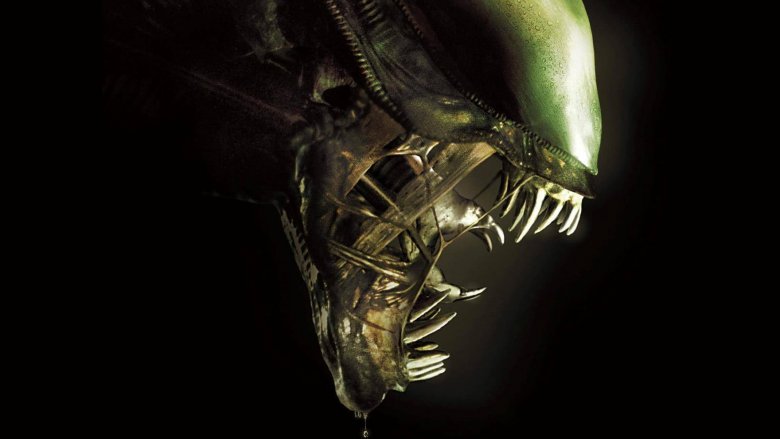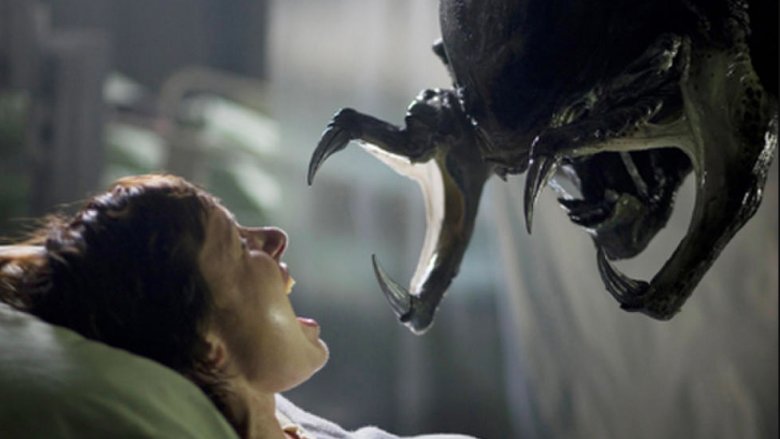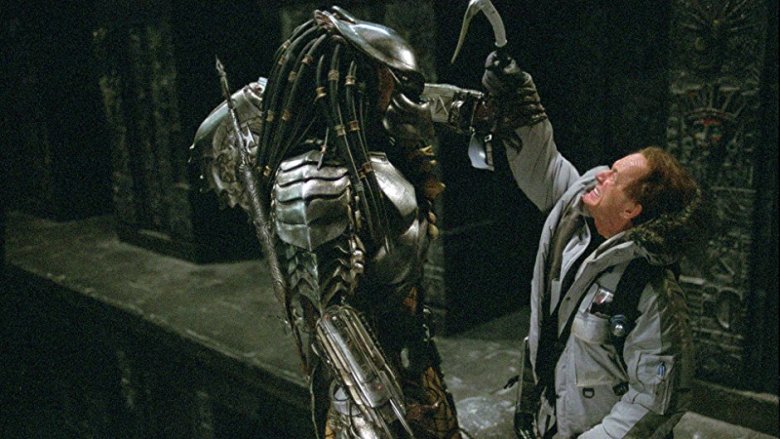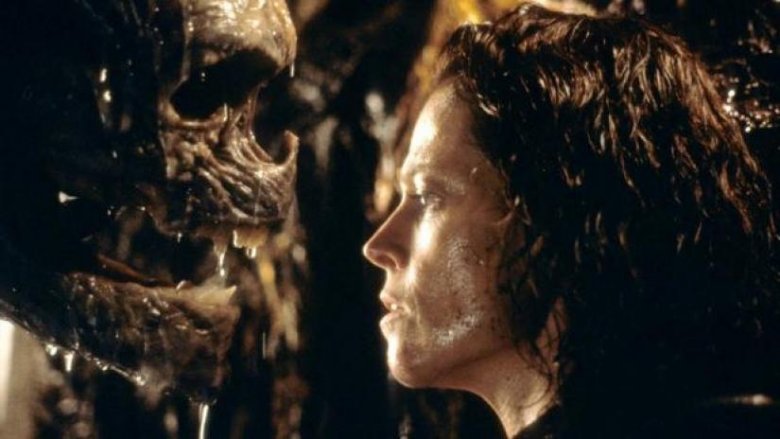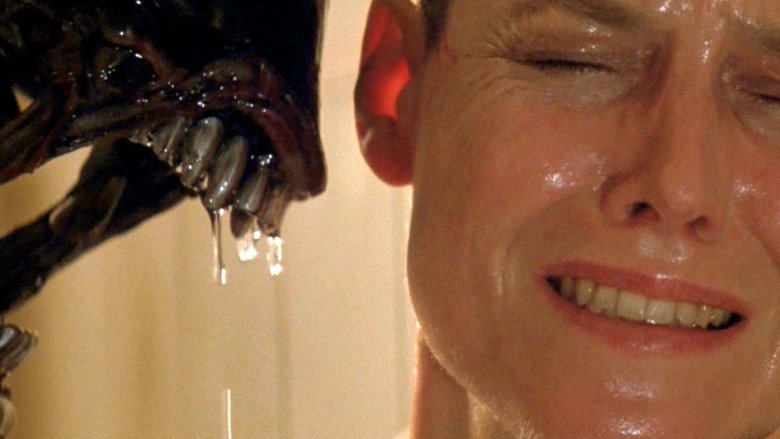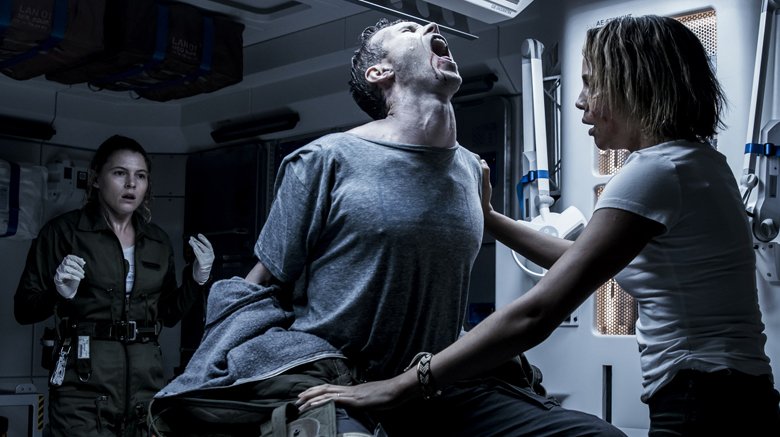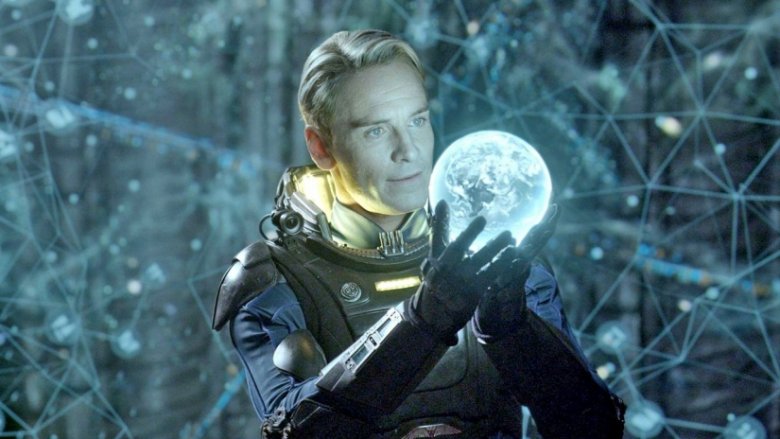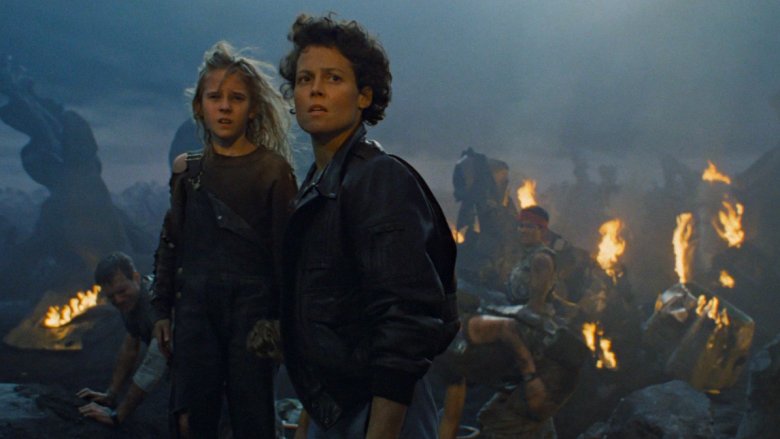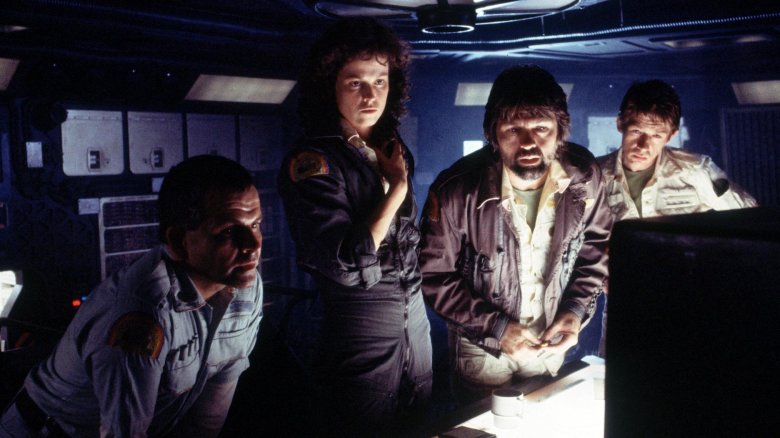Every Alien Movie Ranked Worst To Best
Does alien life exist? What's out there? It's a question many of us have meditated on in equal parts fascination and fear. If there is life outside of Earth, what is it like? Is it friendly or threatening?
The Alien franchise exploits such fears and fascinations, imagining a universe in which "out there" is the xenomorph, the terrifying killing machine that director Ridley Scott introduced in the 1979 masterpiece that started the series — and was still scaring audiences almost four decades later as the bloodthirsty star of 2017's Alien: Covenant.
So durable are the Alien saga's heady themes and visceral thrills that they've proven just as stubbornly difficult to kill as the aliens themselves. The franchise has had more than its share of ups and downs over the years, with sequels and spinoffs that attempted — with varying degrees of critical and commercial success — to recapture the simple, lethally effective impact of the original. A pair of installments even crossed the Alien series over with another iconic sci-fi/horror franchise, setting up the gory detour of the Alien vs. Predator movies.
So how do these tales of what lies beyond Earth stack up? Let's open the airlock and find out. Here are our picks for every Alien movie, ranked worst to best.
Warning: Alien franchise spoilers splattered ahead.
Alien vs. Predator: Requiem (2007)
The Alien vs. Predator movies are a million light years away from their respective individual franchises. Many fans, and probably even Ridley Scott, don't consider them part of the recognized Alien universe — but let's not leave anyone out. Alien vs. Predator picked up the battle between xenomorphs and Predators, with Requiem following directly from those events. A Predator known as Wolf (played by Ian Whyte) travels to Earth following a distress signal.
Wolf utilizes all of his hunting skills when searching for the Predalien, the ghastly result of a facehugger impregnating a Predator. The Predalien is a cool concept, like a xenomorph on steroids, but adding this enhanced hybrid, along with an extra scooping of gore (following AvP's PG-13 rating, Requiem flaunts its R rating proudly) doesn't make up for the fact the film was a huge failure.
Requiem swaps the Antarctic or outer space for Gunnison, Colorado. But witnessing the universe's most feared predators slaughter innocent high school kids is the cinematic equivalent of taking a Ferrari for a spin in a parking lot. Although its effects are admirable, Requiem is too dark. Literally — in some scenes it's impossible to see details of what's going on. Add in poor dialogue, and the movie becomes nothing more than a guilty pleasure with a B-movie status.
Alien vs. Predator (2004)
Alien vs. Predator begins 116 years before the Nostromo's mission and just prior to Wolf's assignment to planet Earth. Events begin when Charles Weyland (Lance Henriksen) discovers a heat signal coming from below the ice in the Antarctic, and funds an expedition to discover the source; soon, the film heads back in time in the franchise's first attempt at explaining the origin of species.
In contrast with Prometheus' focus on the Engineers, the Predators are seen here as a superior godlike species who visited Earth thousands of years before. They were responsible for creating the pyramids, and as part of a ritualistic sacrifice, used the elaborate structures as a hunting ground to test their skills against the deadliest opponents they could find: the xenomorphs.
Humans play their role, too. At the time of the pyramid's conception, they'd sacrificed their bodies to host xenomorphs. Bizarrely, in Alien vs. Predator, humans and Predators join forces — but instead of a match made in the Milky Way, this unlikely union is a disservice to both franchises. It eliminates Predators' sense of danger and ruthless necessity to hunt all species, while reducing the xenomorphs to prey.
Ultimately, it feels like a wasted opportunity to explore the respective universes, though credit is due for attempting an interesting origin. Alien vs. Predator still has its moments, and those attracted to the prospect of a head-to-head battle will enjoy the face-off between Celtic Predator and Prime Alien.
Alien: Resurrection (1997)
In some ways, the entire plot of the Alien franchise's fourth installment, directed by Jean-Pierre Jeunet, is a deus ex machina. True to its title, Alien Resurrection revives Ripley some 200 years after her sacrificial free-fall into molten metal in Alien 3, the result of scientists mixing her DNA with that of the alien Queen. "Ripley 8" is the eighth, and first successful, attempt at cloning, gifted with enhanced strength, agility, acidic blood, a telepathic connection with xenomorphs, and basketball skills that make Catwoman look like a novice.
Set in 2379, Resurrection focuses on a new group of mercenaries who land on the USM Auriga, a top-secret ship and home to alien-altering experiments. The group — including Winona Ryder as Annalee Call and Ron Perlman as Johner — deliver a collection of human bodies for military scientists to sacrifice as part of their ongoing human and xenomorph experimentation. Clearly unsettled by what they discover, they team up with Ripley 8 as experiments get out of hand and hoards of xenomorphs are unleashed.
Weaver's return isn't enough to save Resurrection from repetitive ideas and skin-deep superficiality, but a redeeming factor is the film's self-awareness. When Ripley delivers the line "who do I have to f*** to get off of this boat," a wink to the camera and canned laughter wouldn't be out of place.
Alien 3 (1992)
The troubled production of Alien 3 is well documented. Studio interference and claustrophobic deadlines almost made David Fincher quit Hollywood — as he told the Guardian, "To this day, no one hates it more than me." Thankfully he rebounded with Se7en, but it's easy to understand why he came away so unhappy, and why critics bashed the theatrical cut. However, it's worth noting that 2003's Assembly Cut added almost 40 minutes of footage and closer matches Fincher's original vision.
Alien 3's tagline promised "3 times the suspense, 3 times the danger, 3 times the terror," but failed to deliver on any of those fronts. In hindsight, removed from the expectations following Alien and Aliens, the third installment has positive aspects, and it could've been great had production been a little smoother. Set in 2179, events begin with Ripley crash-landing on Fiorina "Fury" 161, a planet colonized by rage-filled convicts. The danger here isn't only from extraterrestrials, but the humans too.
No matter how much footage was added in the Assembly Cut — including a longer introduction and more characterization for the convicts on Fury — it'll never fix its fatal flaw. Part of Aliens' appeal was the chemistry between Ripley, Newt, and Hicks. Yet Alien 3 kills off Ripley's sidekicks before events begin. Lingering fan dismay at this decision helped spark a lot of support for Neil Blomkamp's proposed Alien 5, which would have retconned those deaths. Sadly, Blomkamp's vision is looking less and less likely to reach the big screen.
Alien: Covenant (2017)
Alien: Covenant's titular spacecraft hosts 2,000 colonists and 1,140 human embryos on its journey to Origae-6. But events take a disastrous, burned-alive-in-your-pod turn for the worse when damage to the ship kills a number of those on board, including the ship's captain, Jake Branson (James Franco). Covenant introduces another female protagonist, Daniels (Katherine Waterston), following in the zero-gravity footsteps of Ripley and Elizabeth Shaw. Daniels — who was Branson's wife — strongly disagrees with newly promoted Captain Oram's (Billy Crudup) decision to divert the ship to a nearby planet. What could possibly go wrong?
How about all the body-bursting, alien-infused carnage one can imagine, as one by one, the crew of 15 are picked off in gruesome fashion? Xenomorphs return to the forefront of the action here, supported by a new, terrifying breed known as neomorphs. Overlook a host of senseless character decisions, and body-horror fanatics will be overjoyed with what's on display, particularly the manifestation of an organism that infects two of the crew and later explodes from backs and mouths in gratuitous glee.
It's also worth watching for a bravura performance from Michael Fassbender in a dual role as androids David and Walter — including one unforgettable scene in which double Fassbender flute-fingers and flirts with himself. The philosophical musing of man vs. god continues, with David taking the role of the latter. Covenant all but reveals xenomorphs were created by David's bioengineering, elevating him to an all-powerful role within the universe.
Considering the Alien franchise gave birth to one of cinema's iconic action heroines in Ripley, it's disappointing to see two recent characters, Shaw and Daniels, unceremoniously killed off. Still, Covenant is outrageous, and if watched with expectations left firmly airlocked, makes for enjoyable sci-fi/horror viewing.
Prometheus (2012)
Set in 2089 (three years before Ripley was born), Prometheus focuses on the expedition of the titular ship and its journey to a far-off moon, LV-223. Archaeologists Elizabeth Shaw (Noomi Rapace) and Charlie Holloway (Logan Marshall-Green) discover a star map that contains an "invitation" sent from the Engineers, an alien species responsible for creating life on Earth (a storyline that seemingly retcons Alien vs. Predator in the process, not that anyone is complaining).
Prometheus introduces David (Michael Fassbender), an android created by Peter Weyland, the CEO of Weyland Corporation and the man funding the expedition. David helps lead the team following their arrival on the moon, where they uncover an alien ship, not unlike the ship in the original Alien. As the crew investigate, they're oblivious to David's secret mission: Following the trend of deceitful androids, he collects samples of a biological weapon created by the Engineers and begins experimenting on the crew.
Scott's return to the franchise is criminally underrated. Yes, it's far from perfect in execution. As with Alien: Covenant, characters make bizarre decisions and it's hard to feel a connection with any of them (the disjointed and flirtatious interaction between Charlize Theron's Meredith and Idris Elba's Janek unfolds like poor fan fiction). But Prometheus is a laudably ambitious attempt at fleshing out Alien's theme of the search for a perfect life form, and how humans can easily play second fiddle to a genetically powerful species — a welcome change from the repetitive, alien-shooting nature of Alien 3 and Resurrection.
Aliens (1986)
Aliens opens in 2179, 57 years after Ripley's escape from the alien-infested Nostromo. Ripley is recovered from space stasis by the Weyland-Yutani Corporation, who don't believe her account of the chilling events she escaped. Much to her dismay, she's recruited to join a mission to Hadley's Hope, a colony on exomoon LV-426, the location of the abandoned ship she and her now-dead crew discovered.
Aliens is one of the greatest sequels of all time. James Cameron does what he does best: Instead of competing with Scott's cat-and-xenomorph jaunt through the claustrophobic labyrinth of the Nostromo, Aliens ups the ante. While Alien has subtle, slow-building chills, Aliens has all-out, alien-splattering action, moving xenomorphs from the shadows into the forefront of the action. In numbers, their visibility makes them all the more hideous.
Not only does Aliens switch the emphasis from horror to action, Ripley's role is impeccably upscaled to fit the amplified setting, making her even more badass. She takes control when all the military-trained men around her stand perplexed and confused, and illustrates female roles can be both macho and maternal when she protects youngster Newt (Carrie Henn) as she tracks down the Alien queen.
Ripley is supported by Bishop (Lance Henriksen) — an android Ripley initially suspects due to her experience with Nostromo's science officer Ash (Ian Holm) — and Corporal Hicks (Michael Biehn). By the time the Alien queen has been forced into cosmic oblivion, the demise of the perfect organism feels even sweeter than it did the first time around.
Alien (1979)
But the first time around is still the best, and on any ranked list of Alien movies, there's only one spot where the original installment truly belongs. Ridley Scott utilized Alien's sci-fi setting to elevate the most unnerving elements of horror to a new, chilling level, providing a blueprint Hollywood still samples from today — see Life and The Cloverfield Paradox for two recent examples. Events are encased in the murky, metallic, and steely cold confines of the Nostromo, a commercial spaceship returning to Earth in 2122. Little do the crew know that attending a distress signal from LV-426 will be a grave mistake.
Like the gelatinous saliva of its alien antagonist, the true horror of the crew's situation is revealed drip by drip. Its visual imagery is striking, with H.R. Giger's designs hard to shake. From facehugging suffocation to the chest-exploding gore, the endless creativity and meticulous attention to detail helped to create a classic.
It's far from simplistic, too. The very best horror is loaded with context and deeper meaning. Alien screenwriter Dan O'Bannon deliberately used sexual imagery to make male audiences uncomfortable, explaining in The Alien Saga documentary that he wanted to "attack the men" in the audience by depicting an alien that "lays its eggs down your throat, the whole number." It's safe to say Alien has made many men (and women) squirm uncomfortably for decades.
Stephen King once said "nothing is so frightening as what's behind the closed door." Indeed, it's the imagination and anticipation in horror that often causes the most unease. But Alien's biggest strength is that, once revealed, the xenomorph is even worse than any viewer could've imagined.
